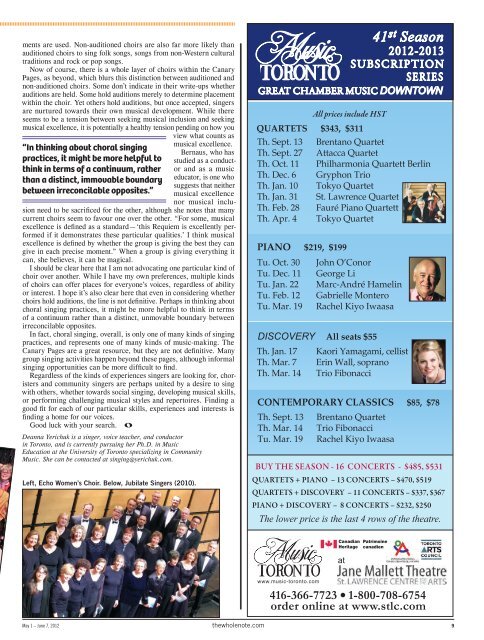A Placefor EachCOMMUNITY AND MUSICALEXCELLENCE IN CHORAL SINGINGby Deanna YerichukIf you have a desire to sing, you’d be hard-pressed not to find aplace for your voice these days. I’ve been studying communitymusic in Toronto, and my sneak peek at The WholeNote’s <strong>2012</strong>Canary Pages confirmed my own sense of the many opportunitiesopen to singers of all ages, abilities and interests. And that’s justwhat’s listed in these pages. If the Canary Pages are the tip of asinging iceberg, then there are likely hundreds of places to singin Southern Ontario. And by all accounts, Ontarians are singing.Even beyond choirs, there has been a recent renaissance of singing,perhaps connected to reality-based televised singing competitions,from Canadian Idol to The Voice, from The Choir to Canada Sings.People today are singing in numbers that would have been exceptionala mere decade ago. Choirs Ontario released a research report in 2011that estimates one in seven Ontarians sing in a choir, whether school,church, community, or professional. Of those types of choirs, thereseems to be a groundswell of community-oriented singing. Yet whatexactly is a community choir, and what distinguishes it from otherkinds of choirs?The term “community” is always troublesome, but particularly soin a choral context: everyone knows what community is and everyoneuses the term in different ways. I tend to define community choirs asopen and inclusive singing environments: choirs that focus on buildingtheir social relationships as much as or more than producing musicalexcellence. Some could legitimately object to my distinction, whichsuggests that professional or semi-professional choirs have no community.Isabel Bernaus, a Toronto-based conductor of Common ThreadCommunity Chorus of Toronto as well as the Jubilate Singers, feels thatboth choirs exemplify community, though in different ways. CommonThread is non-auditioned, implementing deliberate musical and socialinclusion policies to welcome all singers regardless of musical experienceor skill level. Jubilate Singers, on the other hand, is an auditionedchamber choir, yet there is a strong sense of community within thechoir. “Singing together isn’t the same,” Bernaus says, “if the peoplesinging have no connection with each other.”In other cases, use of the term community is linked to the presenceof amateurs, particularly referring to choristers who have fewskills or less experience. This might be true to a certain extent forsome choirs, but this distinction doesn’t hold well across the board.More often, a divide between amateurs and professionals in a choralcontext is less an indication of skill level and more an indicationof whether the choristers receive an income for their work, similarto the distinction between amateur and professional athletes.Whenever the word “amateur” was used in these Canary Pages,it was almost always next to words like “professional”or “musicalexcellence” suggesting that while those choristers are not compensated,they are assumed to meet a high standard of experience and skill.In other cases, the word community in a choral context is used toindicate non-affiliation — in other words, that the choir in question isnot associated with either a church or a school. Yet, the usefulness ofsuch a distinction quickly breaks down with a little scratching belowthe surface. Choirs Ontario estimates that a whopping 58% of choirsin Ontario have some form of church affiliation. Compare that to communityand professional choirs, which comprise a combined total of11% of all choirs in Ontario. Yet church choirs have often automaticallybeen excluded from community choir surveys and research.“A church choir is a community choir but it’s a specific kind ofcommunity,” suggests Becca Whitla, director of both Echo Women’sCommunity Choir and Holy Trinity Church Choir in downtown Toronto.“Church choirs provide an opportunity for singers to experience themystery of the divine.” Whitla, who is currently completing a Mastersof Sacred Music at the University of Toronto, points out that somethingmysterious happens in secular singing contexts too, something transcendentalor transformative. However, in sacred contexts, people areintentionally seeking this engagement with the divine through song.“Singing is embodied and allows us to have that opportunity to connectthrough something transcendent. It doesn’t happen only in church. Ithappens when it happens.”Clearly, the term community is complex to the point that it mightnot meaningfully indicate any particular set of singing practices. Soin my own research, I’ve looked for other trends or terms that mightindicate what kinds of choirs aim primarily to be inclusive, and whatkinds aim primarily for a precise musical product, or what some mightcall “musical excellence.” Where I have started to notice a fundamentalsplit in process and goals was when I considered whether choirs heldauditions or not.Not every listing in the Canary Pages indicates whether potentialsingers need to audition, but from those that do, there definitely seemsto be a different ethos towards musical and social objectives dependingon whether auditions determine entry into the choir.Non-auditioned choirs, or at least those choirs that explicitly statea no-audition policy in their write-ups, tend to talk about providingwelcoming and supportive atmospheres, encouraging anyone interestedto join. Choirs that clearly have auditions describe their choral settingsand goals much differently. These choirs tend to consist of professionalor semi-professional choristers, aiming for musical excellence.Further, auditioned choirs tend to be smaller ensembles. They tendto tour and record. They are also far more likely to perform with moreelaborate instrumentation. It also appears that many (though certainlynot all) tend to focus on Western European classical music, althoughfrom different time periods, and from varying geographic regions.Non-auditioned choirs, on the other hand, are often large ensembles.These choirs often perform a cappella or accompanied by one instrument(most frequently piano or guitar), thoughin a few cases, more instru-Katherine FleitAS, Peace Photo8 thewholenote.com <strong>May</strong> 1 – June 7, <strong>2012</strong>
ments are used. Non-auditioned choirs are also far more likely thanauditioned choirs to sing folk songs, songs from non-Western culturaltraditions and rock or pop songs.Now of course, there is a whole layer of choirs within the CanaryPages, as beyond, which blurs this distinction between auditioned andnon-auditioned choirs. Some don’t indicate in their write-ups whetherauditions are held. Some hold auditions merely to determine placementwithin the choir. Yet others hold auditions, but once accepted, singersare nurtured towards their own musical development. While thereseems to be a tension between seeking musical inclusion and seekingmusical excellence, it is potentially a healthy tension pending on how youview what counts as“In thinking about choral singingpractices, it might be more helpful tothink in terms of a continuum, ratherthan a distinct, immovable boundarybetween irreconcilable opposites.”musical excellence.Bernaus, who hasstudied as a conductorand as a musiceducator, is one whosuggests that neithermusical excellencenor musical inclusionneed to be sacrificed for the other, although she notes that manycurrent choirs seem to favour one over the other. “For some, musicalexcellence is defined as a standard — ‘this Requiem is excellently performedif it demonstrates these particular qualities.’ I think musicalexcellence is defined by whether the group is giving the best they cangive in each precise moment.” When a group is giving everything itcan, she believes, it can be magical.I should be clear here that I am not advocating one particular kind ofchoir over another. While I have my own preferences, multiple kindsof choirs can offer places for everyone’s voices, regardless of abilityor interest. I hope it’s also clear here that even in considering whetherchoirs hold auditions, the line is not definitive. Perhaps in thinking aboutchoral singing practices, it might be more helpful to think in termsof a continuum rather than a distinct, unmovable boundary betweenirreconcilable opposites.In fact, choral singing, overall, is only one of many kinds of singingpractices, and represents one of many kinds of music-making. TheCanary Pages are a great resource, but they are not definitive. Manygroup singing activities happen beyond these pages, although informalsinging opportunities can be more difficult to find.Regardless of the kinds of experiences singers are looking for, choristersand community singers are perhaps united by a desire to singwith others, whether towards social singing, developing musical skills,or performing challenging musical styles and repertoires. Finding agood fit for each of our particular skills, experiences and interests isfinding a home for our voices.Good luck with your search.Deanna Yerichuk is a singer, voice teacher, and conductorin Toronto, and is currently pursuing her Ph.D. in MusicEducation at the University of Toronto specializing in CommunityMusic. She can be contacted at singing@yerichuk.com.Left, Echo Women’s Choir. Below, Jubilate Singers (2010).<strong>May</strong> 1 – June 7, <strong>2012</strong>thewholenote.com 9


















